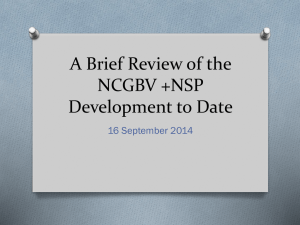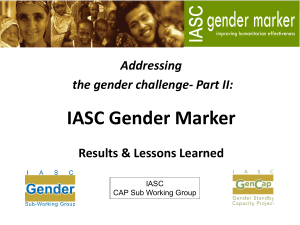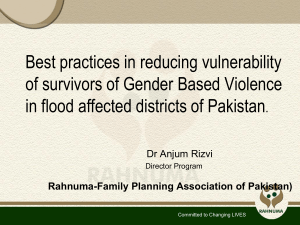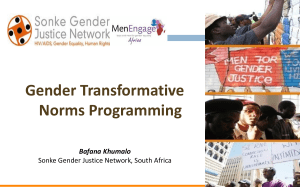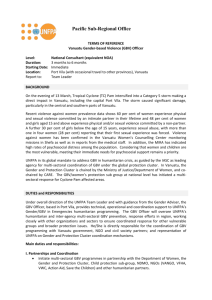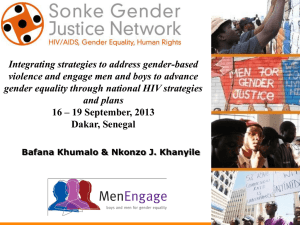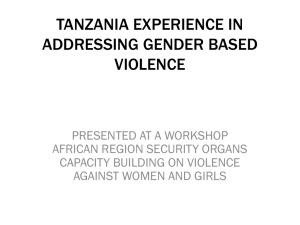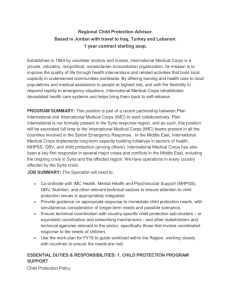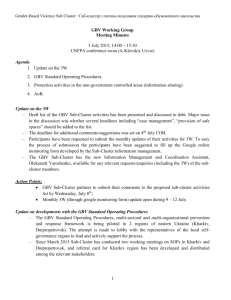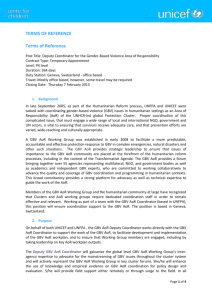Updated-ToR-for-Consultant-to-develop-Emergency
advertisement
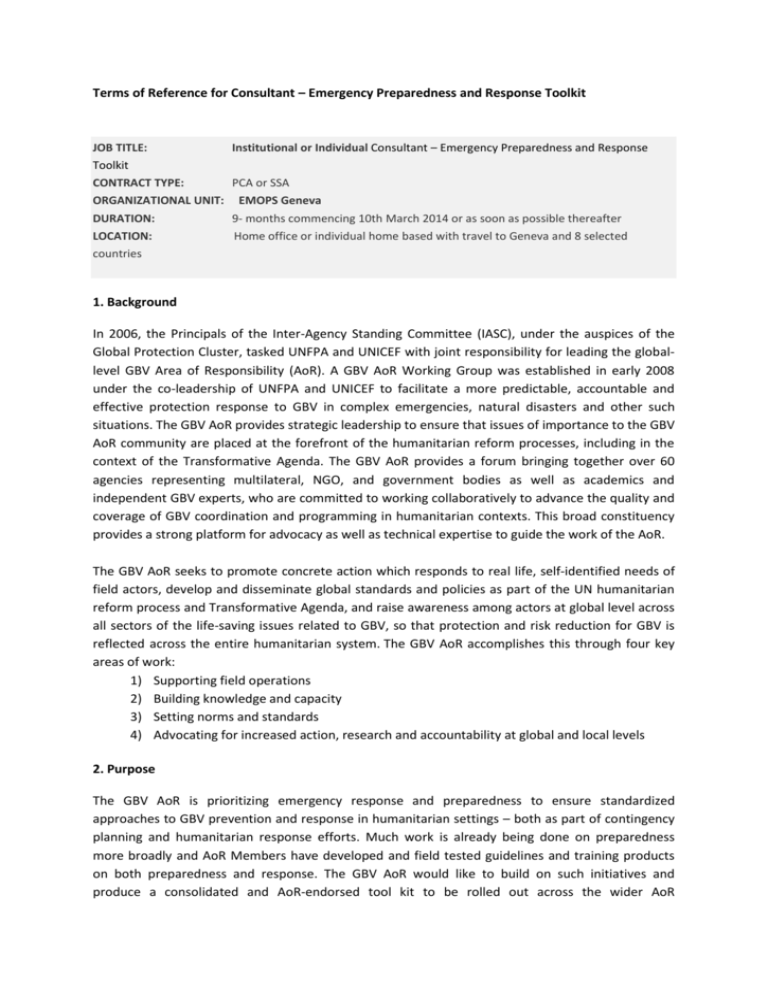
Terms of Reference for Consultant – Emergency Preparedness and Response Toolkit JOB TITLE: Institutional or Individual Consultant – Emergency Preparedness and Response Toolkit CONTRACT TYPE: ORGANIZATIONAL UNIT: PCA or SSA EMOPS Geneva DURATION: 9- months commencing 10th March 2014 or as soon as possible thereafter LOCATION: Home office or individual home based with travel to Geneva and 8 selected countries 1. Background In 2006, the Principals of the Inter-Agency Standing Committee (IASC), under the auspices of the Global Protection Cluster, tasked UNFPA and UNICEF with joint responsibility for leading the globallevel GBV Area of Responsibility (AoR). A GBV AoR Working Group was established in early 2008 under the co-leadership of UNFPA and UNICEF to facilitate a more predictable, accountable and effective protection response to GBV in complex emergencies, natural disasters and other such situations. The GBV AoR provides strategic leadership to ensure that issues of importance to the GBV AoR community are placed at the forefront of the humanitarian reform processes, including in the context of the Transformative Agenda. The GBV AoR provides a forum bringing together over 60 agencies representing multilateral, NGO, and government bodies as well as academics and independent GBV experts, who are committed to working collaboratively to advance the quality and coverage of GBV coordination and programming in humanitarian contexts. This broad constituency provides a strong platform for advocacy as well as technical expertise to guide the work of the AoR. The GBV AoR seeks to promote concrete action which responds to real life, self-identified needs of field actors, develop and disseminate global standards and policies as part of the UN humanitarian reform process and Transformative Agenda, and raise awareness among actors at global level across all sectors of the life-saving issues related to GBV, so that protection and risk reduction for GBV is reflected across the entire humanitarian system. The GBV AoR accomplishes this through four key areas of work: 1) Supporting field operations 2) Building knowledge and capacity 3) Setting norms and standards 4) Advocating for increased action, research and accountability at global and local levels 2. Purpose The GBV AoR is prioritizing emergency response and preparedness to ensure standardized approaches to GBV prevention and response in humanitarian settings – both as part of contingency planning and humanitarian response efforts. Much work is already being done on preparedness more broadly and AoR Members have developed and field tested guidelines and training products on both preparedness and response. The GBV AoR would like to build on such initiatives and produce a consolidated and AoR-endorsed tool kit to be rolled out across the wider AoR Membership. This will include building upon previous work that the GBV AoR did through the development of a draft Technical Note: Gender-Based Violence and Disaster Risk Reduction: Practical Approaches for Better Programming. Lessons from past emergencies reveal that preparedness efforts must be made collaboratively, and must be made clear to all, or there will likely be additional suffering and increased protection concerns. Preparedness work is underway in various sectors – and as part of an overall humanitarian strategy guided by the IASC - and prevention and response to GBV fits within this framework1. The GBV AoR has an obligation to prioritize GBV within this framework, particularly following learning from the Philippines Emergency, which highlighted the central importance of Disaster Risk Reduction. For this reason, the GBV AoR has decided to develop and roll out a collectively endorsed Emergency Preparedness and Response Toolkit. The qualifying agency or individual consultant will work under the supervision of the GBV AoR Deputy Coordinator to support the GBV AoR in providing leadership in the area of GBV prevention and response in emergencies. The consultant is also expected to contribute to 1) learning, evidence generation and knowledge management, and 2) support capacity-development and provide technical support to regional and country offices in line with the Toolkit. 3. Major Outputs The qualifying agency or individual consultant will work in close consultation with the GBV AoR Coordinator and Deputy Coordinator to achieve the following outputs: 1) The consultant will engage with the AoR to ensure that the toolkit builds upon and complements existing tools in order to finalise an AoR-endorsed tool kit. This tool kit should include training materials and field-ready tools to support cross-sectoral preparedness and response interventions to reduce risks to women and girls in emergencies and to ensure the establishment of safe, accessible services for survivors of GBV. 2) Tools should define and clarify roles of coordinating and implementing agencies, and should be grounded in practical actions to enhance the quality of humanitarian assistance around GBV. 3) Preparedness and contingency planning tools should include a focus on mapping, assessing and building capacity of partners and participating institutions, recommendations for oversight and quality assurance mechanisms such as a preparedness audit and recommendations on integrating GBV contingency planning into other ongoing planning processes such as UNDAFs and CHAPs. 4) The toolkit should include a focus on Disaster Risk Reduction (DRR), including tools to ensure GBV is considered in wider DRR processes. Increasing community capacities to prevent and respond to GBV is a fundamental aspect of reducing risk. The tool kit should include guidance for actively engaging women and girls in DRR efforts in relation to GBV risk mitigation and response capacity, and working with local disaster preparedness groups and government bodies on integrating GBV prevention and response into their existing frameworks, policies, programmes and capacity development efforts. 1 See for example the IASC Sub-Working Group on Preparedness: http://www.humanitarianinfo.org/iasc/pageloader.aspx?page=content-subsidi-common-default&sb=14 5) Include accompanying tools suitable for emergency use, incorporating adult learning methods, and focusing on clear and simple guidance: o Workbook and accompanying DVD o Training and capacity building modules for GBV response organizations o Checklists of agreed priority preparedness actions by sector, in line with the IASC GBV guidelines o Assessment tools including decision-making systems around prioritisation of emergency interventions in eight countries identified (see post) and make recommendations for strengthening linkages between GBV and other sectors assessments, preparedness planning and response o Sample scenarios for simulations o Good practice examples in emergency preparedness and response o Tools for ensuring accountability to preparedness measures o Core messaging and outline advocacy strategy to accompany emergency preparedness and response toolkit 6) Convene inter-sectoral group to serve as review board for strategic guidance and commentary on the Toolkit. 7) Align work with ongoing preparedness efforts and other efforts to standardize humanitarian response across sectors. 8) Collaborate with other Rapid Response Teams for coherent approach across sectors. 9) Align with the revised IASC GBV Guidelines and all associated tools, including for accountability and advocacy, and the Child Protection Minimum Standard for Sexual Violence Support field sites in piloting the Toolkit, including managing all revisions to the Toolkit as a result of piloting. 10) Provide technical support to roll out Toolkit to 8 high-risk countries as per prioritization criteria endorsed by the AoR Strategic Advisory Group (SAG) 11) Identify and develop a strategy for roll out of the Toolkit once finalized and endorsed by SAG and wider AoR Payment Modalities: The qualifying agency or individual consultant will be paid on a monthly basis at a rate of approx. $ 8330per month subject to satisfactory monthly progress reports 4. Required Skills and Experience of qualifying agency or individuals Essential Advanced university degree in Social Sciences, Public Health, Law or a related technical field Direct experience in working on GBV in emergencies Minimum of 5 years of humanitarian or related work experience, including previous experience working in a conflict affected area and/or natural disaster Experience with GBV and CP programming Experience in programming in conflict affected countries and/or natural disasters Experience in training, facilitation, capacity building, strategy development, etc. Proven leadership skills, including the ability to set priorities, manage time effectively, and contribute to a team environment of respect, recognition, and mutual accountability Excellent spoken and written English Excellent communication skills Desirable Knowledge of child protection programming in emergencies more broadly Institutional capacity /Fluency in a second UN language, preferably French 5. Competencies Core Values and Ethics • Demonstrate cultural sensitivity and able to work in a multi-national environment • Support the goals of the GBV AoR • Comply with UN rules, regulations and code of conduct • Demonstrate integrity Teamwork • Build effective relationships and partnerships • Interact with all members of the GBV AoR • Excellent interpersonal skills • Build and share knowledge • Provide guidance and support to others • Apply existing knowledge to work • Make valuable practice contributions Communication • Excellent oral and written skills • Listen actively and respond effectively Task Management • Plan, prioritize and deliver a variety of tasks on time • Exercise sound judgment/analysis • Develop creative solutions Learning • Promote learning environment • Provide constructive coaching and feedback for others Applications via CV or institutional submission and covering later providing a statement of interest and how your background fits the requisite competencies and skills should be sent to Joanne Dunn Deputy Global GBV AoR Coordinator at jdunn@unicef.org on or before 7th March 2014
